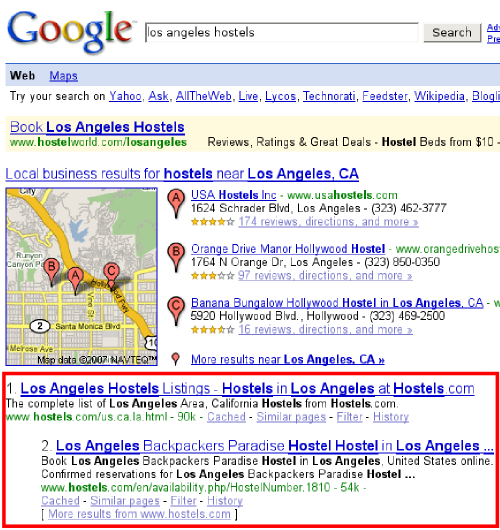This article describes a way that you can increase bookings to your hostel by increasing the search engine rankings of the pages about your hostel on hostel booking engines' Web sites.
In other words, you can get more bookings by helping your listings on the hostel booking engines' Web sites rank higher.
What Google Likes
Google loves old Web sites with a lot of text information and a lot of links from other Web sites. Hostel booking engines rank well because they have a lot of on-topic information and a lot of inbound links from other related Web sites.
Here are the Google results for a search for sydney hostels. Notice that three of the top four results are WRI Web sites (Hostelworld) and the other one is Hostelbookers.

(Side note: There is another article that covers how to get your hostel listed in Google Maps at the top of the search engine results pages.)
The booking engines have very strong search engine rankings and there is a way that you can use that to your advantage, by having Google show your specific hostel's page (on the booking engines) in the listings.
Piggybacking (Riding) on the Other Web Site
Notice how in the following Google query for los angeles hostels the first result (hostels.com) has two listings, and one of them is for a specific hostel:
You have some control over whether your specific hostel's page gets listed like that in Google.
Step 1: Reduce Duplicate Content
Search engines have duplicate content filters. When a search engine sees two or more pages with the same text, they generally filter out the duplicates and show only the one that is perceived by the search engine to be "the most important one".
One potential problem with hostel search engine marketing is that hostels often post the same duplicate text across many different booking Web sites. If your hostel's listings have the same text on many different booking engines, those duplicate pages often won't get much visibility in the search engines because of duplicate content filters.
When listing your property on other Web sites, try to use different text for each listing. It's better not to copy and paste content from your Web site into other Web sites. For best visibility on the Internet, every page on the Web that mentions your hostel should have unique text.
Step 2: Use Keyword-Rich Text
Search engines love keywords. Be sure to incorporate keywords into the text that you put on your booking engine listings. Be sure to include the name of the city/town/country name several times as well as the words "hostel" and "hostels", and other keywords like "telephone", "directions", and popular attractions. It's important to keep the text "human-friendly" so that it doesn't look like you are "keyword stuffing". You don't have to have a high keyword density; it's just important that the keywords appear on the page at least a few times.
Important Tip:
Whenever referring to your hostel, try to include the word "hostel" or "hostels" and the city and country names. In the example double-listing above, the hostel is referred to in the title as Los Angeles Backpackers Paradise Hostel. If they had just referred to themselves as simplyBackpackers Paradise they wouldn't have gotten the extra exposure in Google for the keywords los angeles hostels.
For maximum visibility in search engines, include the city name, country name and the word "hostel" or "hostels" whenever you mention your hostel online.
Piggyback
I call this "piggy back" marketing (or SEO) because you are "piggy backing" (riding) the success of another Web site that already ranks well.
This is only a brief introduction to piggyback marketing, but I hope it is enough information to help get more bookings. You can also use the same technique on any kind of external Web site, and I will cover some examples in a future article.


